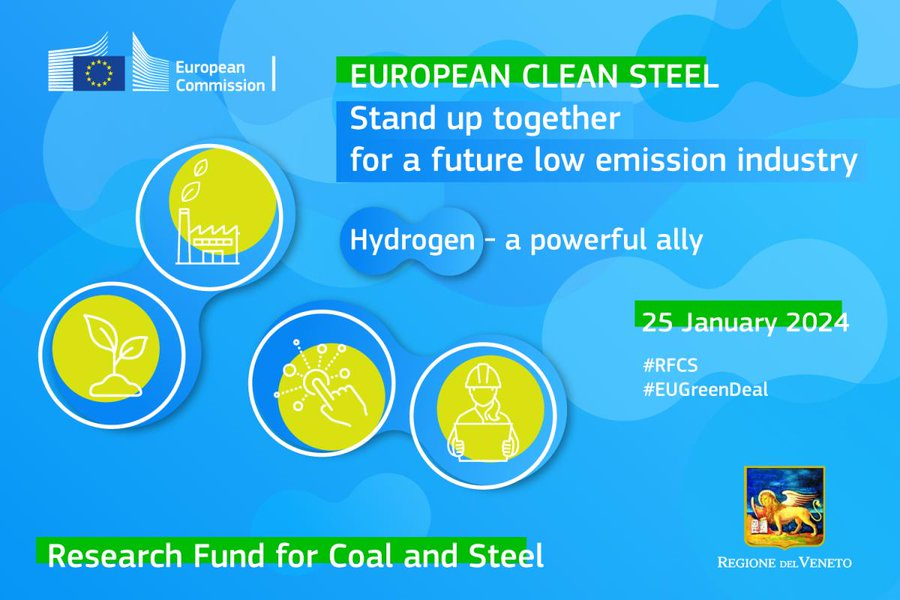
On January 25, representatives from HaDEA will join colleagues from the Research Executive Agency (REA) at a workshop on clean steel in Venice. The event, titled "European clean steel: standing together for a low-emission industry" is organised in collaboration with the Veneto Region (Italy) and will focus on hydrogen as a powerful ally for steelmaking. It will bring together stakeholders involved in the decarbonisation of the European steel industry.
HaDEA implements several projects in the field of steel, to help tackle the challenge of the EU industry’s transition towards climate neutrality. In particular, it already manages projects funded under Horizon Europe as part of the Clean Steel Partnership for a total budget of around €70 million. These projects cover scientific areas such as: circularity through improvement and valorisation of scrap, development and upscale of low-carbon technologies and optimisation of steel process production. In total, Horizon Europe will dedicate €350 million to steelmaking research for the period 2021-2027 under the Partnership.
Discover 10 of the running Clean Steel Partnership projects managed by HaDEA (from the 2021-2022 work programme):
-
MaxH2DR is dedicated to H2-enriched direct reduction in shaft furnaces (H2-DR) and aims to fill the knowledge gaps related to material properties and conditions in the shaft furnace.
-
CAESAR brings together steelmakers, metal recyclers, technology developers and research centres in a joint effort to validate integrated scrap upgrading, sorting, and characterization technologies at full-scale industrial operations. This will allow the utilization of low-quality scrap streams in Europe, while keeping a high-quality product and generating valorisation routes for all the non-ferrous fractions, ultimately working towards a zero-waste steel sector. .
-
HIYIELD focuses on increasing the efficient use of scrap metal while reducing reliance on coal-fired blast furnaces to reduce associated CO2 emissions. The project's goals include providing tools and equipment to maximise steel production yield through better scrap usage, and the utilisation of scrap-derived alloys.
-
ReMFra will allow to valorise steelmaking residues, such as filter dust, scale, sludge, and slags, to obtain pig iron, iron rich oxides, a highly concentrated zinc oxide and an inert slag.
-
RecHycle is working to optimise the combination and integration of metallurgic gases, and the potential of green hydrogen, through use of a gas hub in order to reduce carbon footprint in steelmaking.
-
PURESCRAP aims at increasing the use of low-quality scrap grades (post-consumer scrap) by deploying and applying best available technologies to reduce impurities. The project will integrate sensor stations in the two separate processing chains for heavy (cut) and shredded scrap to improve the impurity removal and enable a more efficient scrap processing.
-
TransZeroWaste is investigating upgrading technologies for iron-containing materials to increase recycling potential while being compatible with direct reduction and electric arc furnace processes.
-
GreenHeatEAF aims at demonstrating the integration of non-fossil fuels and renewable carbon sources in Electric Arc Furnace (EAF) process to decrease CO2 emissions and dependence from fossil energy and C-sources markets. The project focuses also on improving heat recovery solutions from off-gases and slag considering the changes of their features with the introduction of H2 and/or biomass and considering charge materials and modes.
-
HyTecHeat utilises hybrid heating in downstream steelmaking processes (reheating furnaces and refractory preheating). Together with hybrid heating, the utilisation of natural gas and hydrogen is also intended. Impact on steel quality will be studied with lab tests.
-
ModHEATech targets the decarbonisation of rolling mills by introducing "hybrid heating” technologies, based on a proper combination of electrification and gas-burning to replace traditional gas burning in reheating furnaces. This solution provides an opportunity to explore the synergic effect of different technologies.
Background
Horizon 2020 was the EU’s multiannual funding programme between 2014 and 2020. H2020 provided Research and Innovation (R&I) funding for multi-national collaboration projects alongside individual researchers and SMEs via special funding instruments. Horizon 2020 is succeeded by the Horizon Europe Programme, which will run until 2027.
Details
- Publication date
- 24 January 2024
- Author
- European Health and Digital Executive Agency
- Programme Sector
- Industry
- Programme
- Horizon Europe
- Horizon Europe Cluster 4: Industry
- Tags
- EUFunded
- Event
- Innovation
